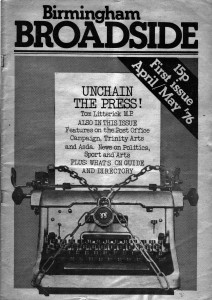Alan Clawley looks back on a golden age of Birmingham political writing.
Jeremy Corbyn has obviously released a wave of nostalgia for the 1970s in the left wing of British politics. People who regard themselves as on the left or progressive wing of politics can look back to the era when the label ‘socialism’ was worn with pride.
Birmingham even had a socialist magazine called Broadside which incorporated two defunct left-wing titles, Grapevine and West Midlands Grassroots both of which were started in 1971; Grapevine on the crest of the alternative press of the late sixties, and Grassroots in response to the then emerging community action movement.
In its first edition, published in April 1976, Broadside carried a long article by Mike Gibson on the campaign to stop the Birmingham Post Office in Victoria Square being demolished for commercial office development. By then efforts to save the Victorian Reference Library had failed and Madin’s Central Library had been opened by Harold Wilson. The Post Office campaign, however succeeded in getting the former Head Post Office listed and eventually occupied by the TSB Bank.
Andy Foster, writing in Pevsner (2005) believed that the success of this campaign “marked the end of post-war comprehensive redevelopment in Birmingham”. Although that conclusion is questionable given the subsequent revival of redevelopment mania in the 21st century, there is no doubt that at the time the result was a victory for the left-wing and the trades union movement in Birmingham.
Broadside’s second issue ran an article on the Lucas Aerospace Combined Shop Stewards Committee’s Corporate Plan which detailed a number of products, using existing technology, which they considered would keep the Lucas workforce expanding but which – unlike military aircraft – would benefit society as a whole. They wanted Lucas to develop low-energy housing, solar heat, fuel cell technology, and various medical electronic applications to help the disabled or limbless and provide ‘sight’ for the blind. Lucas declined to consider the Corporate Plan.
Broadside’s final comment, prescient in the light of the crash of 2008 and the resurgent debate over the futility of Trident, was; “The government has already demonstrated their subservience to the banking mafia by cutting public expenditure. Will they also show us that they can think and plan further than men [Lucas bosses] who believe that military aircraft are socially useful?”
While the success of the Post Office campaign was a feather in the cap of the left-wing the battle against public expenditure cuts was being waged with less obvious success using language that resonates today. Under the headline Cuts: Fighting Back, the writer states, “The government’s policy of cutting expenditure on Education, Social Services, Housing and Transport has suddenly become the battleground for socialism in Britain.”
But in another edition, Broadside announces under Left Crisis On Agenda, the first meeting of a Birmingham group designed to tackle what was seen as a crisis of the left. Its convenor TL Fisher said “the Left in Britain had suffered serious setbacks over the past year. On the major battles it has fought – the Common Market, the pay policies, the National Enterprise Board, the cutbacks in public expenditure, and the AUEW elections in particular – it has suffered serious defeats.”
I don’t know how long Broadside lasted but the latest issue in my possession, number 9, was dated June 1977 and by then we were heading for the election of the Thatcher government. One feature of Broadside has, however survived to this day – the work of cartoonist Steve Bell. His strip cartoon ‘MAXWELL THE MUTANT – marauding the Midlands’ appeared in Broadside No.6 in 1977 signed S. Bell. Today’s Guardian readers will be familiar with his current work.




Intriguing article. Considering that Bham was served adequately by the mainstream press for so long,before the collapse of The Post and the vacuity of Central TV and the current blandness of radio, it’s nice to Know there was an alternative voice.